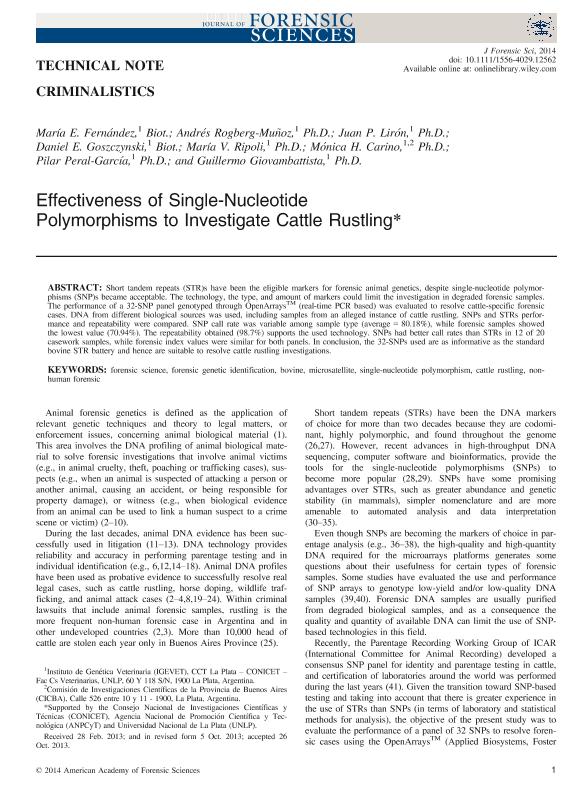Artículo
Effectiveness of Single-Nucleotide Polymorphisms to investigate cattle rustling
Fernandez, María Elena ; Rogberg Muñoz, Andres
; Rogberg Muñoz, Andres ; Liron, Juan Pedro
; Liron, Juan Pedro ; Goszczynski, Daniel Estanislao
; Goszczynski, Daniel Estanislao ; Ripoli, María Verónica
; Ripoli, María Verónica ; Carino, Mónica H.; Peral Garcia, Pilar
; Carino, Mónica H.; Peral Garcia, Pilar ; Giovambattista, Guillermo
; Giovambattista, Guillermo
 ; Rogberg Muñoz, Andres
; Rogberg Muñoz, Andres ; Liron, Juan Pedro
; Liron, Juan Pedro ; Goszczynski, Daniel Estanislao
; Goszczynski, Daniel Estanislao ; Ripoli, María Verónica
; Ripoli, María Verónica ; Carino, Mónica H.; Peral Garcia, Pilar
; Carino, Mónica H.; Peral Garcia, Pilar ; Giovambattista, Guillermo
; Giovambattista, Guillermo
Fecha de publicación:
11/2014
Editorial:
Wiley
Revista:
Journal Of Forensic Sciences
ISSN:
0022-1198
Idioma:
Inglés
Tipo de recurso:
Artículo publicado
Clasificación temática:
Resumen
Short tandem repeats (STR)s have been the eligible markers for forensic animal genetics, despite single-nucleotide polymorphisms (SNP)s became acceptable. The technology, the type, and amount of markers could limit the investigation in degraded forensic samples. The performance of a 32-SNP panel genotyped through OpenArraysTM (real-time PCR based) was evaluated to resolve cattle-specific forensic cases. DNA from different biological sources was used, including samples from an alleged instance of cattle rustling. SNPs and STRs performance and repeatability were compared. SNP call rate was variable among sample type (average = 80.18%), while forensic samples showed the lowest value (70.94%). The repeatability obtained (98.7%) supports the used technology. SNPs had better call rates than STRs in 12 of 20 casework samples, while forensic index values were similar for both panels. In conclusion, the 32-SNPs used are as informative as the standard bovine STR battery and hence are suitable to resolve cattle rustling investigations.
Archivos asociados
Licencia
Identificadores
Colecciones
Articulos(IGEVET)
Articulos de INST.DE GENETICA VET ING FERNANDO NOEL DULOUT
Articulos de INST.DE GENETICA VET ING FERNANDO NOEL DULOUT
Citación
Fernandez, María Elena; Rogberg Muñoz, Andres; Liron, Juan Pedro; Goszczynski, Daniel Estanislao; Ripoli, María Verónica; et al.; Effectiveness of Single-Nucleotide Polymorphisms to investigate cattle rustling; Wiley; Journal Of Forensic Sciences; 59; 6; 11-2014; 1607–1613
Compartir
Altmétricas



